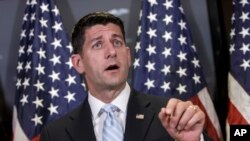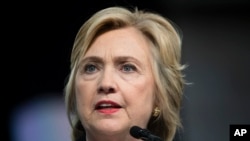Donald Trump is speaking in New York Saturday after finally making it official Friday and naming his vice presidential running mate as Indiana Governor Mike Pence. Trump revealed his choice on Twitter on a day when the U.S. presidential campaign was overshadowed by the aftermath of the truck attack in Nice, France, which has sparked fresh concern about terrorism worldwide and has reasserted itself atop the U.S. presidential campaign agenda.
Both presidential candidates quickly weighed in on the Nice attack in television interviews late Thursday. Trump told Fox News, “This is war. We are living in a different world,” and added that he would ask Congress to declare war on the Islamic State if elected president in November.
Presumptive Democratic nominee Hillary Clinton also condemned “the horrific attack” in France in an interview on CNN, adding that the U.S. and its European allies now face “a different kind of war” against “radical jihadists.”
Trump cited the Nice attack as the reason for postponing Friday’s official announcement of a running mate. Pence won out over at least two other finalists for the vice presidential pick—former House Speaker Newt Gingrich and New Jersey Governor Chris Christie.
Conservatives pleased
Republican establishment figures generally welcomed the news that Pence will be Trump’s running mate, citing his reputation as a staunch traditional social conservative who could bring some stability to the ticket. House Speaker Paul Ryan praised the choice, citing Pence as someone who “makes a compelling case for conservatism.”
Several analysts agreed. “Pence will help Trump cozy up with traditional conservatives,” said John Hudak, a Senior Fellow in Governance Studies at the Brookings Institution in Washington. “Pence helps a little bit more with social conservatives” than some of the other contenders and “offers some of the government ‘chops’ (expertise) that you typically look for in a candidate.”
Pence was elected Indiana governor in 2012 and previously served six terms in the House of Representatives where he established a record as a traditional small-government conservative who had strong support from social conservatives and evangelical Christians as well.
Clinton: Pence "divisive and unpopular"
The Clinton campaign issued a statement from campaign chairman John Podesta calling Pence "the most extreme pick in a generation" known for supporting economic policies that "favor millionaires and corporations over working families." Democrats also contend Pence is seen as a divisive figure in Indiana because he signed last year's Religous Freedom Restoration Act into law. Supporters said it was designed to maintain religious freedom while critics called it anti-gay rights.
Most analysts saw the Pence pick as a clear effort by Trump to fully bind the Republican Party ahead of its convention, which begins Monday in Cleveland. “Pence may be the best possible pick for Trump under the circumstances,” said Larry Sabato, the Director of the Center for Politics at the University of Virginia. Sabato said given Trump’s other contenders—Gingrich and Christie—Pence could “conceivably shore up some of Trump’s weaknesses among certain strands of the GOP base.”
But many pundits doubt Pence will have much success in drawing support from non-Republicans in the general election campaign. “He’s not somebody who appeals to independent voters or Democrats. He’s somebody who appeals to the factions of the Republican Party who are still nervous about Trump,” said Justin Buchler, a political scientist at Case Western Reserve University in Ohio.
Sabato and others note that historically, vice presidential selections tend to matter little in the election outcome. Historians often cite John Kennedy’s decision to add rival Lyndon Johnson to the 1960 Democratic Party ticket as the last time a vice presidential contender produced political benefits for their party. Johnson helped Kennedy carry Johnson’s home state of Texas and a few other southern states in a close race with the Republican candidate, Vice President Richard Nixon.
How voters view Clinton, Trump on handling terrorism
As for the fresh focus on security and the threat of terrorism, the latest CBS News-New York Times poll showed Clinton and Trump tied at 46 percent each on the question of who would do a better job of handling national security and terrorism. Clinton led in that same category in the same poll one month earlier by a margin of 50 to 43 percent.
The latest Quinnipiac University poll found voters thought Trump would be more effective than Clinton against the Islamic State by a margin of 52 to 39 percent. But when voters were asked in the same poll who would do a better job of handling an international crisis, they preferred Clinton over Trump by a margin of 51 to 42 percent.
Analysts also note that concerns about terrorism and security tend to spike in the immediate aftermath of terrorist attacks, such as those late last year in Paris and San Bernardino, California.










